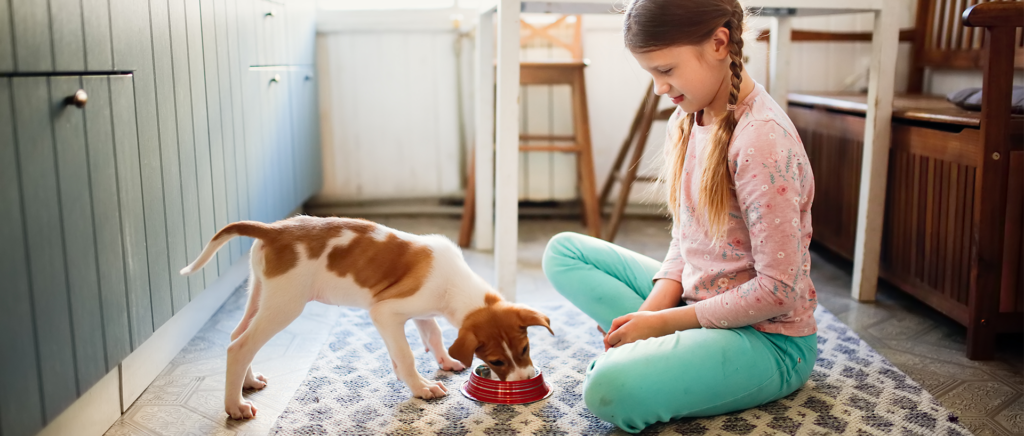Caring for pets is a great way for kids to learn responsibility and empathy. But some pet-care tasks aren’t appropriate for young children. For the comfort and safety of both your pets and kids, it’s important to choose age-appropriate dog chores for your little one. Here, we’ve talked to a few experts about what tasks are appropriate for children by age.
Younger Than 5: Small Tasks
For kids younger than five, it’s most beneficial for them to observe proper pet care at first. Then they can learn to assist you with small tasks. Denisse Bernal, director of humane education at the Society for the Prevention of Cruelty to Animals Los Angeles, recommends that kids help an adult with things like mixing pet food or passing the pet dish. “Children will inevitably be curious about the pet they are sharing a home with, so proactively engaging even the youngest of children in these ways will help set a foundation for the development of a positive relationship between the child and the pet,” she says.
For play sessions, Bernal recommends adults help kids toss toys to dogs. This establishes a positive relationship between child and pet early on.
Ages 6 to 9: Feeding
As they grow up, kids between six and nine years old are ready to handle a little more responsibility. “With direct guidance and supervision, children in this age group can start learning how to feed pets safely and how to give their pets treats,” says Bernal. She says they can help with basic grooming—tasks like brushing the pet—and even help with positive reinforcement training.
“Training is important, especially for dogs, because it helps to establish the child as an authority figure in the dog’s life rather than a littermate,” says Andrew Horan, founder of Citizen K9 in Gainesville, Virginia.
Ages 10 to 13: Supervised Cleaning
When kids reach the ages of 10 to 13 years old, it’s time for them to start handling more complex aspects of pet care. “Adults can start incorporating this age group into some of the less glamorous work that comes with responsible pet care, such as cleaning cages, cleaning out the litter box, or scooping poop in the yard,” says Bernal. Supervision at this stage is still very important. And don’t forget to be sure kids wash their hands thoroughly after cleaning up after pets or feeding them.
Children at this age can walk dogs outside the home, but only with the supervision of a parent to avoid safety concerns like stray dogs, unexpected reactions by the dog or your pup getting free of his leash, says Bernal.
Ages 14 and Older: Learning All Tasks
Teens can handle most tasks that adults do, says Wyatt Fisher, Psy.D., a licensed psychologist in Boulder, Colorado. “However, there should be periodic integrity checks to ensure they are doing a good job.”
Bernal advises that if exercise or play for a pet needs to happen in a public place, then the adult should not make this an independent task for the teenager, as sound, reliable judgment may be needed. The same goes for advanced care like nail trims and vet visits—but teens should assist parents with those tasks to understand the full spectrum of required pet care.
“However, older teenagers may be tasked with feeding, bathing, brushing, training, and in-home exercising of the family pet, but it is the adult’s responsibility to determine how much the teenager can reasonably handle and whether or not any special considerations need to be made for their particular pet,” Bernal says.
If your children sometimes seem unwilling to care for pets, it’s important to motivate them. “Parents should introduce tasks as opportunities to contribute to the pet’s well-being as opposed to ‘chores’ that no one wants to do,” says Bernal. Make pet-care tasks fun and regularly praise and reward your kids for caring for furry family members, rather than simply reprimanding them when they do something wrong.
